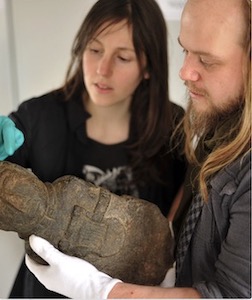Call for Papers: Archaeo-Luthiery
- Published: Wednesday, 10 January 2024 10:35
- Hits: 1298
On the occasion of the 30th Annual Meeting of the European Association of Archaeologists, to be held from August 28 to 31 in Rome (Italy), a call for papers has been launched for a colloquium on the archaeo-violin making, or how to understand instruments from an archaeological point of view, from the Celts to the Middle Ages. Answer by February 4, 2024.
Call for Papers
Archaeo-Musicology and Archaeo-Luthiery
Knowledge and Know-How Serving
the Reactivation of Celtic and Medieval Music
Argument
 If it is accepted that violin making is defined as the craftsmanship of stringed and necked instruments still used today, we can call “archaeo-violin making” the craftsmanship of musical instruments of the past, the physical traces of which are too fragmentary to be able to work by reproduction, as is the case for instruments kept in collections. Archaeo-violin making sets itself the task of restoring disappeared instruments of which we only know through indirect documents such as archaeological remains and iconographic and textual sources. This is the case for instruments from the celtic period and Middle Ages, of which the very rare instruments preserved or discovered by archeology do not allow, due to their character either being too specific or very late, to claim exhaustive knowledge of an organology medieval and celtic period extended over ten centuries.
If it is accepted that violin making is defined as the craftsmanship of stringed and necked instruments still used today, we can call “archaeo-violin making” the craftsmanship of musical instruments of the past, the physical traces of which are too fragmentary to be able to work by reproduction, as is the case for instruments kept in collections. Archaeo-violin making sets itself the task of restoring disappeared instruments of which we only know through indirect documents such as archaeological remains and iconographic and textual sources. This is the case for instruments from the celtic period and Middle Ages, of which the very rare instruments preserved or discovered by archeology do not allow, due to their character either being too specific or very late, to claim exhaustive knowledge of an organology medieval and celtic period extended over ten centuries.
The process necessary for the restitution of these instruments takes on the trappings of archaeo-musicology. This presents itself as a particularly multidisciplinary field of study, addressing fields as diverse as archaeology, musicology, social and political history, the history of art and techniques, but also the history sensitivities and contemporary cultural values to these instruments, at work in their genesis and in musical practices.
Thematic Focuses
- Medieval instruments
- Celts instruments
- Reverse engineering of musical instruments
Proceedings
Proceedings will be published in the year following the colloquium.
The speaker undertakes to present his or her paper and then to provide an English paper for publication according to the specifications and dates provided later.
Participation conditions
You can participate remotely (online) or on-site (see location).
In both cases, a special access online will be provided by EAA for networking and participation.
Registration fees remain the same in both cases.
Submission guidelines
Contributions will be accepted as 15-minutes presentation (plus 5 minutes Q&A)
Colloquium language is only English in order to facilitate the publication of the proceedings.
The proposals must consist of:
- a paper title
- an abstract of fewer than 250 words (2,000 characters with spaces)
- the name/s, email address/es and institution/s of author/s
The submission should be uploaded on the EAA Annual Meeting website before February 8, 2024.
Confirmation: 25 March 2024
Participation fees
Registration and fees on the EAA Annual Meeting Registration Policy.
Once your paper is selected, you have until April 20, 2024 to send your EAA ID number and registration proof to recherche@arkeotopia.org.
Organization Committee
- Gisèle Clément (Associate professor, Univeresité de Montpellier 3 & Centre International de Musiques Médiévales - France)
- Asier de Benito (Independent scholar - Spain)
- Jean-Olivier Gransard-Desmond (Head of research, ArkéoTopia - France)
Location
Buildings from Sapienza University of Rome
Piazzale Aldo Moro 5 00185 Roma (Italy)







